“Everything I did was so that God would keep my father safe.” The story of a young woman who transformed her pain into helping the Ukrainian military
From the rooftop of a Kyiv shopping centre, a striking view of Maidan Nezalezhnosti (Independence Square) unfolds. Black crows wheel above this historic site, chased by the wind. Below, a small female figure is walking quickly - Sofiia, whom we are about to meet, arrives slightly late, delayed by work matters.
A blonde woman in a black coat teamed with a knitted scarf smiles and holds out her hand. "I'm Sofiia, nice to meet you." One of the crows lands nearby as if listening to her story.
She looks down, momentarily breathless. A minute later, she whispers: "Sorry.
So many memories of people who are no longer here."
Advertisement:Becoming
Sofiia Dutchak was born in Zolochiv, Lviv Oblast, in Ukraine's west. Her parents, a builder and a teacher, were always her best friends, teaching her to love Ukraine and value freedom. As Sofiia speaks about her family, her gentle smile paints a picture of an ideal family - the kind you see in movies or advertisements.
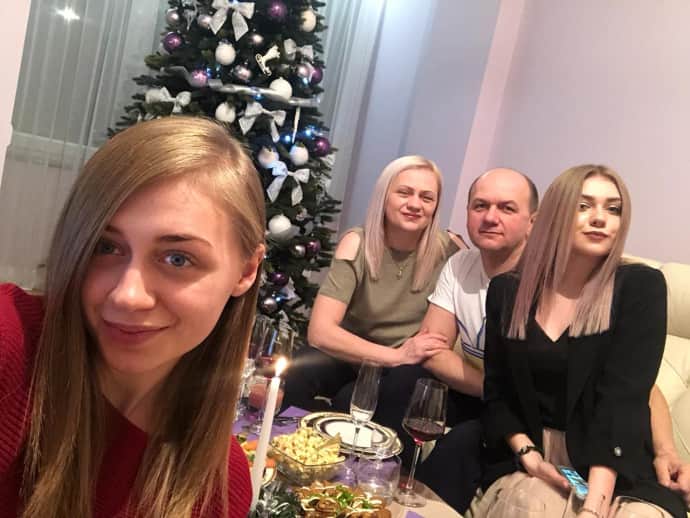 Sofiia with her family (parents and sister) on Christmas.Photo: Volodymyr Pashchuk , "Come back alive"
Sofiia with her family (parents and sister) on Christmas.Photo: Volodymyr Pashchuk , "Come back alive"
Every year, St Nicholas would leave ice skates under the children's pillows - ice skating was a hobby Sofiia shared with her younger sister Yana.
One winter, due to severe frost, school was cancelled for the day. Their father gathered the whole family and suggested they go to the ice rink. That day was one of hundreds of happy days in Sofiia's childhood: they skated all day, played in the snow, and laughed together.
After leaving school, Sofiia enrolled in a university in Kyiv to study journalism. She had just turned seventeen when the Revolution of Dignity began in Ukraine. "My studies had just started - so many things happening, new people, new meanings.
And then the Revolution of Dignity began. I think my sense of justice is innate, passed down from my father. So when Mustafa Nayyem tweeted that we were gathering at Maidan Nezalezhnosti, I went straight there," Sofiia recalls.
Standing in the cold rain with strangers, feeling the powerful energy of unity in the air, she felt a newfound sense of belonging. No one could predict how this movement would shape Ukraine's future, or that war would follow. But for Sofiia, those moments cemented her path.
The road "chaos / home"
Over the next decade, Sofiia built a career in marketing.
When the full-scale war began, she and Yana awoke to explosions in Kyiv. An hour later they were on a metro platform. "It was pure chaos.
I sat against the station wall, trying to take in what was happening." They decided to return home. Their father's friend Ayman drove more than 300 km from Rivne to Kyiv to rescue them without hesitation.
The sisters walked to the outskirts of Kyiv. There were military convoys, packed civilian cars, fighter jets flying overhead. Crowds of people were walking along the road, carrying suitcases, pets and children.
The feeling of complete disorientation only began to ease once they got into Ayman's car.
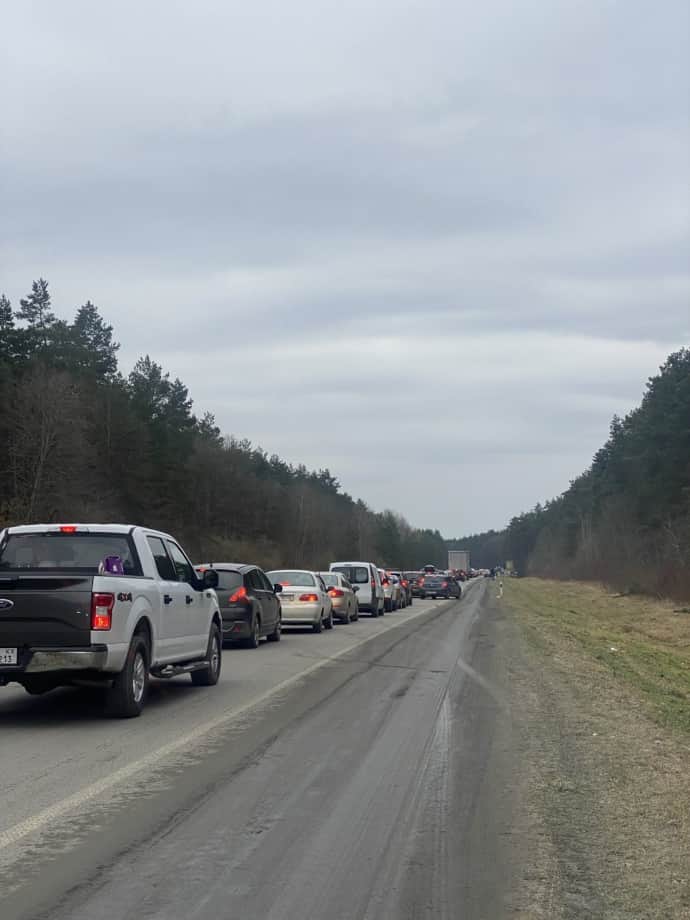 A line of civilian cars evacuating at the start of the war.Photo: Volodymyr Pashchuk , "Come back alive"
A line of civilian cars evacuating at the start of the war.Photo: Volodymyr Pashchuk , "Come back alive"
They reached Rivne, spent the night there, and then continued on foot towards Zolochiv. Their uncle picked them up midway and drove them home. Only then did they finally exhale - it felt safer at home.
Sofiia's parents, who were abroad on holiday, immediately decided they would return to Ukraine and help in any way they could. "They never even considered staying abroad to wait out the war. Although Yana and I worried about how they'd get home, we never considered leaving either - we all understood that we had to stay in Ukraine," Sofiia says.
"Don't be afraid of life"
A week later, their parents arrived in Zolochiv.
It was one of the happiest reunions of their lives. Telling the story later, Taras said he and his wife were the only ones at the border travelling into Ukraine. The border guards were astonished and asked why they were returning when there was a war on.
Two or three days later, the girls' father gathered the family together: he had an announcement to make. "I've signed up for Territorial Defence." Silence.
Then he added: "What, did you think I was just going to sit at home? Don't be afraid of life. If you are, it will crush you."
This became Sofiia's lifelong motto. There was no point in trying to dissuade him. Still, the sense of danger weighed on Sofiia and her family.
Her father had never fought before or served in the military. He immediately went away for training, and within weeks his brigade was sent to the front lines.
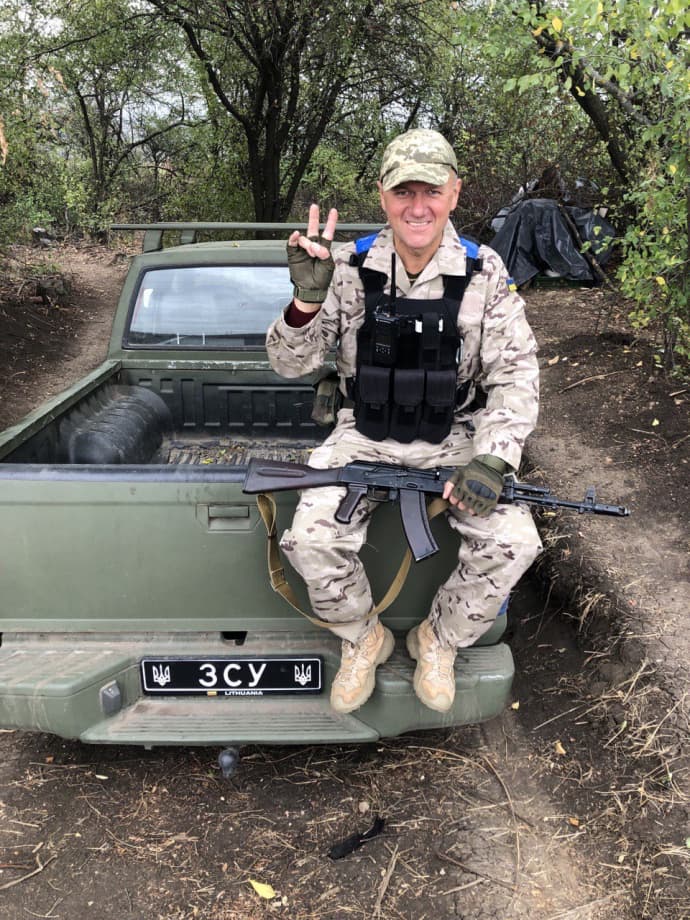 Taras, Sofiia's father, on the frontline during his deployment.Photo: Volodymyr Pashchuk , "Come back alive"
Taras, Sofiia's father, on the frontline during his deployment.Photo: Volodymyr Pashchuk , "Come back alive"
At first, Taras served as an ordinary private. "Whenever I said my father was a hero and the best in the world, he would always reply, 'Oh, come on, sweetheart, your dad is just a regular soldier.' But he was an extraordinary person who thought he was ordinary his whole life," Sofiia recalls.
Later, Taras Dutchak was promoted to private first class and then platoon commander. However, as his daughter remembers, rank never really mattered to him. When he enlisted, the family did not even think about his military salary.
Sofiia had already planned to find a second job to ensure her father had everything he needed. The family constantly supported him - and not just morally. Taras' daughters regularly covered his needs, buying him a bulletproof vest, vehicles, drones, ballistic headphones, and more.
Most of the money they earned was spent on the war effort. For everything they couldn't afford on their own, they organised fundraising campaigns on social media. The constant searches, purchases and deliveries became a huge part of their lives.
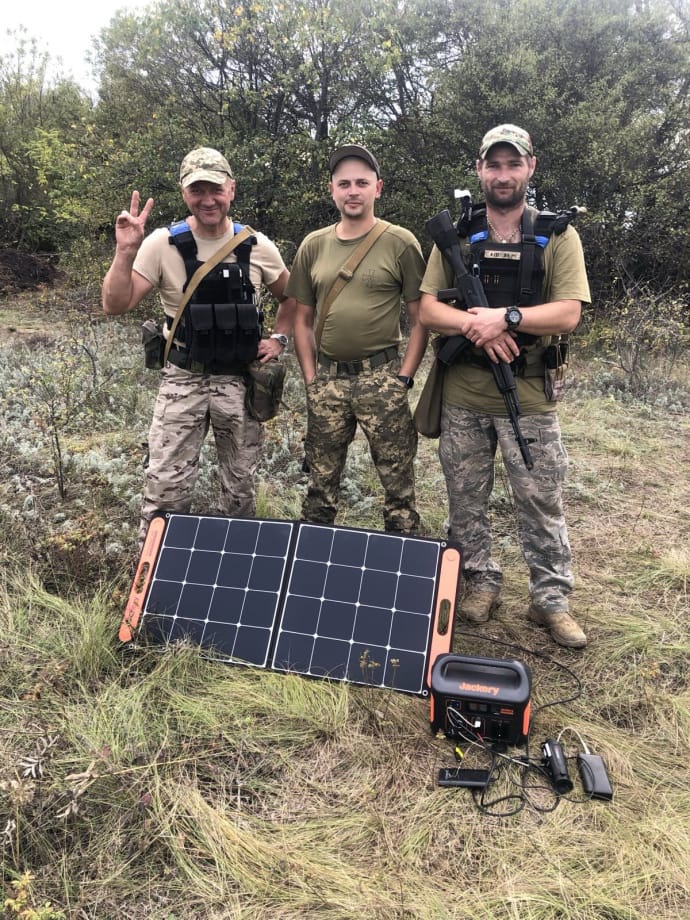 Taras with his brothers in arms and supplies brought by his daughters.Photo: Volodymyr Pashchuk , "Come back alive"
Taras with his brothers in arms and supplies brought by his daughters.Photo: Volodymyr Pashchuk , "Come back alive"
"For over a year, I lived with the thought that the more I did, the more I gave, the more of my own resources I contributed, the better things would be for my father.
It was important for me not just to organise fundraisers and come up with ideas to raise money, but also to give away something of my own. I so desperately wanted someone up there - God or some higher power - to see how much I was doing and to keep my father safe," Sofiia says.
Siverko
During his first rotation in Bilohorivka, Taras adopted a stray dog he named Siverko, after the city he was defending. He sent pictures of Siverko to his family and told them stories about him - how the dog feared nothing and would fight against bigger, stronger animals, and was just a funny, loyal companion.
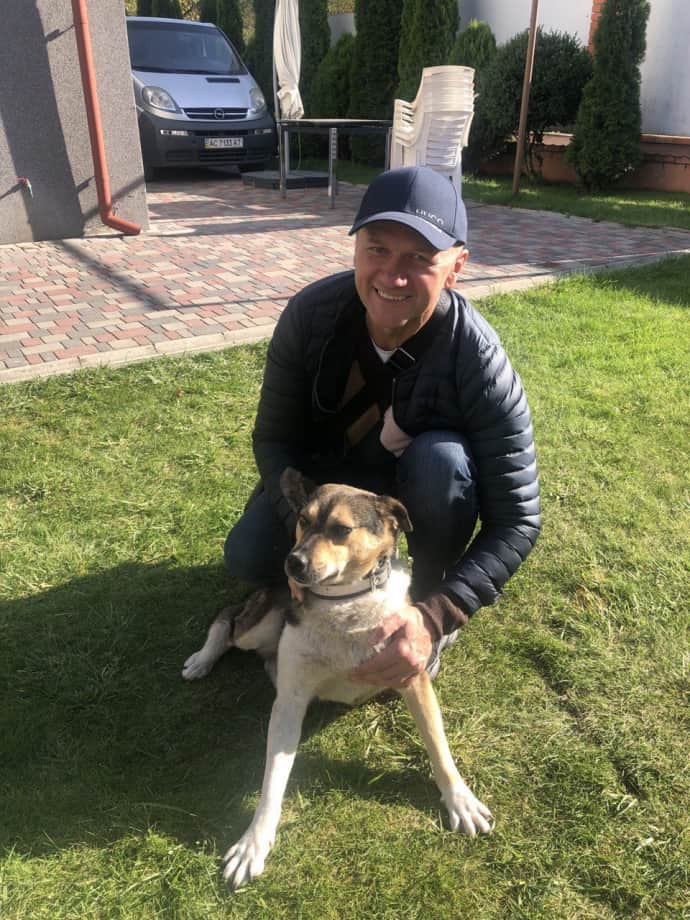 Taras and Siverko.Photo: Volodymyr Pashchuk , "Come back alive"
Taras and Siverko.Photo: Volodymyr Pashchuk , "Come back alive"
Loving animals as he did, Taras refused to leave him behind when he left Bilohorivka.
Volunteers took Siverko to Zolochiv, where he became part of the family. "We quickly fell in love with Siverko - because Dad loved him, which meant he was part of our family now," Sofiia recalls. Taras shielded his daughters from the horrors of war.
When he answered their calls or texts, his voice was cheerful. If he didn't want to worry them, he'd simply say he couldn't talk at that moment. The sisters quickly learned that when that happened, it meant something was wrong.
But even now, they still don't fully know what their father endured on the front lines. When he didn't respond for a long time, they tried to push away their worst fears. But sometimes, time felt like hell, every second of silence stretching into eternity.
All they could do was wait - and scratch Siverko behind the ear, trying to soothe themselves. "I love my mum very much, but my father was always my best friend - the person I could tell absolutely anything. I could send him a website with a complete database of cheese labels, share a Pink Floyd track, talk about my therapy session, or tell him about some new scientific term I had learned.
And he would always respond. He told me stories about animals, his comrades, his commander, and life at the front. Why didn't you hear me, God?" Sofiia covers her face with her hands.
"Sofiika, Dad is gone"
On 25 October 2023, Taras Dutchak was killed in a tank attack near Naukove, Kharkiv Oblast.
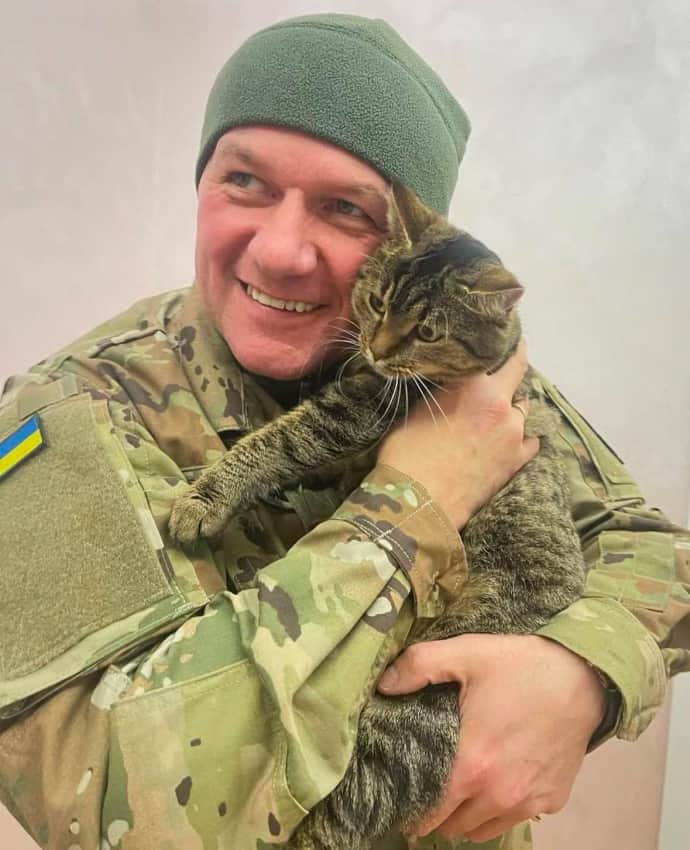 Taras Dutchak.Photo: Volodymyr Pashchuk , "Come back alive"
Taras Dutchak.Photo: Volodymyr Pashchuk , "Come back alive"
That morning he'd sent his usual message, wishing his girls a good day and letting them know that he and Kotya - a cat he had rescued near his position - had been up since 5 am, both on their feet (or paws).
He mentioned that he would be busy and might not be able to reply for a while. Later, Sofiia, feeling unwell, texted him with a selfie: "Look, Daddy, we're sick." By evening, concern was mounting.
Sofiia reassured her mother: "He's probably just busy. He'll get in touch soon - it's happened before." The conversation repeated every hour.
Finally, Sofiia suggested calling one of his comrades to check on him. "I left my phone in the kitchen and walked into my room. When I came back, I saw a missed call from Mum.
I was sure she was going to tell me everything was fine, that Dad had just been delayed. I called back. 'Sofiika, Dad is gone!'
Mum's voice was not her own. I will remember that scream forever." Sofiia collapsed, screaming.
Her father was gone, and there was nothing she could do to change that. Her father never saw that selfie she had sent him.
Pain is proportional to love
We recorded this interview over two days. When Sofiia reached the part about her father's death, she broke down in tears, and we decided to pause.
Later, she texted: "I'm sorry my emotions took over. Talking about Dad was harder than I expected. I overestimated my strength."
It was the first time she had told the whole story from start to finish. Perhaps it was the first time she fully realised just how much she and her family had endured. Two months after Taras' death, tragedy struck again - Sofiia's mother was diagnosed with cancer.
Sofiia had feared this might happen. Her parents had loved each other deeply, and her mother had struggled to cope with the loss of her husband. For the last six months before Taras' death, she had lived in constant fear for him.
That kind of emotional stress leaves a mark. "It was a wake-up call. Yana and I immediately switched into action mode.
We decided we would do whatever it took to help Mum recover. In a way, this even distracted us from grieving for Dad. It gave us something to focus on, something to fight for.
We believed that Dad would help us. And he did - after a year, Mum's cancer went into remission," Sofiia says.
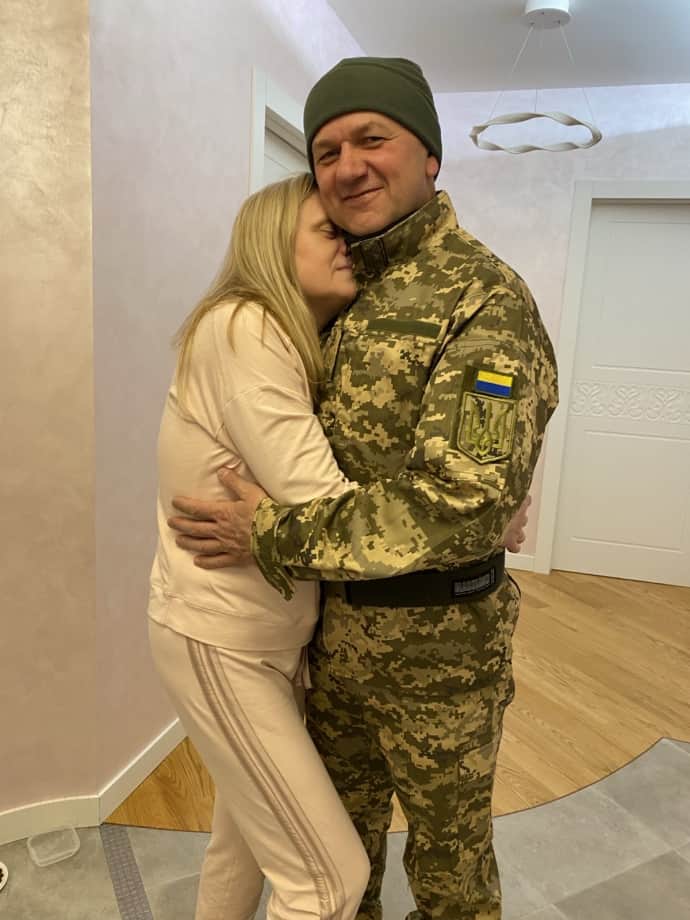 Taras with his wife.Photo: Volodymyr Pashchuk , "Come back alive"
Taras with his wife.Photo: Volodymyr Pashchuk , "Come back alive"
But the pain of loss has never left her. She knows it never will.
It will simply transform into something else. "Pain is proportional to love. The love between my parents was immense.
The love my father had for us, his daughters, was beyond measure. These are the kinds of love that can't be quantified. That's why this pain, this loss, will stay with me forever.
But so will the countless beautiful memories, the messages he left me, and everything he instilled in me from birth," she says. On the second day of our interview, we meet at Maidan Nezalezhnosti, among the metal stands displaying images and descriptions of the Orange Revolution that took place here in 2004. Sofiia immediately recalls how her parents had travelled to Kyiv at the time and brought home orange scarves.
This sparks a conversation about the "curse of Ukrainian generations". "My great-grandfather was deported to Russia, my grandfather fought in the UPA (the Ukrainian Insurgent Army), and now my father. They all died for Ukraine.
It seems like the entire history of this country is of people fighting for independence so that the generations after them won't have to. But how do we break this cycle? It's an existential question."
Sofiia pauses for a moment, then answers. "This is the answer I give myself: I have to do everything I can. If I am not to feel ashamed, I must channel 100% of my hatred for the enemy and my pain from losses into something useful."
Neither she, nor her sister, nor their mother have lost faith in their country since experiencing their personal tragedies. On the contrary, Sofiia says, their love for Ukraine has only grown stronger. "For me, valuing my country has always been among my highest priorities.
And now, when one of the most important people in my life has given his life for Ukraine, I want to stand tall with pride for my country, for everything I see: the trees, the people, the buildings, the windows I glance into. Everything has become even more sacred and meaningful. My father decided that he was ready to sacrifice his life so that all of this could continue to exist.
How could I not stand up for it the same way?" She looks around, takes a deep breath, and continues: "The most important thing is for pain to be sublimated into something constructive - something that allows for growth - rather than into destruction, panic, overwhelming guilt, or blaming others.
War is passed down from generation to generation, and these existential questions arise over and over again. If you don't find a personal answer, it can consume you. You can burn out.
That's why I ask myself: what can I do?"
Helping to heal
"Our family decided to live in a way that would make our father proud. I want to believe he sees what I'm doing. If he knew I wasn't drowning in despair, but rather doing something, he would be proud," Sofiia says.
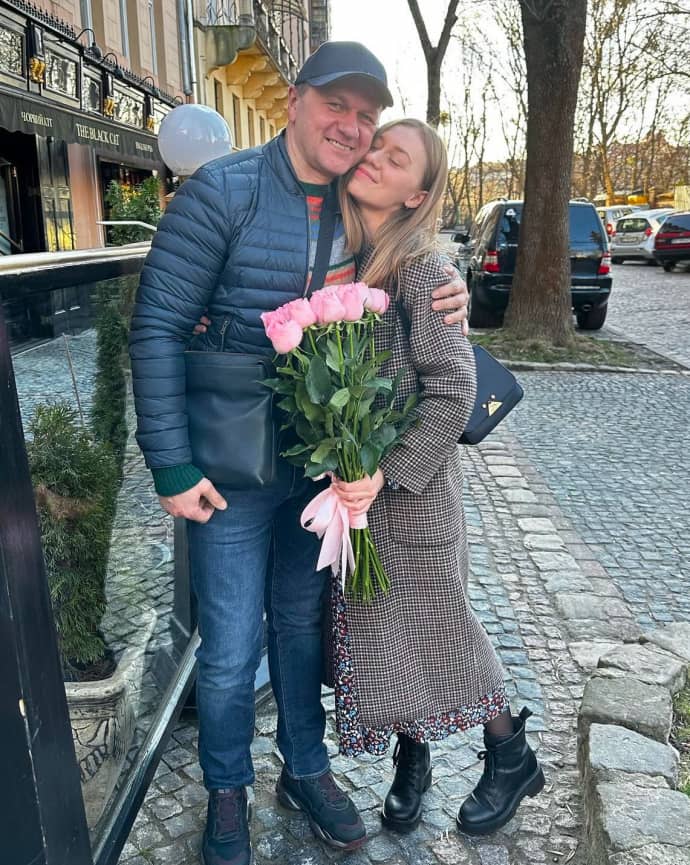 Taras and Sofiia.Photo: Volodymyr Pashchuk , "Come back alive"
Taras and Sofiia.Photo: Volodymyr Pashchuk , "Come back alive"
A month before her father's death, on her birthday, Sofiia raised around UAH 250,000 (around US£6,100) to repair a vehicle for his comrades.
The amount she raised was more than they needed, so there was still UAH 40,000 (US£975) left in the fundraising account. After hearing the devastating news from the front, her father's fellow soldiers suggested she keep that money for her family's support. But Sofiia refused.
Instead, she added her own money and purchased a drone for the unit. Fundraising became her way of contributing. Sofiia, who has built a large social media following, took it seriously.
"I don't just sit there waiting for money to come in. That's not how it works. You need direct connections, personal stories, values, and a clear message.
All of these things together are the formula for an effective fundraiser. I set a goal, and I know that there are people who share my beliefs - they will come and help. I'm not ashamed to personally ask people to donate.
Why should I be? My father gave his life defending this country. Besides, I think contributing yourself is another key to successful fundraising.
I've always done that." At the end of 2024, Sofiia led her biggest fundraiser yet, with a target of UAH 1.2 million (around US£29,000), for Zbroienostsi (Armour Bearers), a project that equips brigades with weapons. She personally reached out to businesses for support, secured 15 sponsors, and donated UAH 10,000 (US£240) herself to set the tone.
The first UAH 100,000 (US£2,400) came in within hours. Two days later, they hit 500,000 (US£12,000). By Christmas Eve, they had reached 1 million (US£24,000), and on Christmas night, they closed at 1.2 million (US£29,000).
"People say that fundraisers don't work as well anymore, that people have stopped donating the way they used to. But if you approach it from a personal perspective, everything will work out," Sofiia says. "You can message a friend, a colleague, remind people about it, share your personal story, and explain why this is important to you. Personal stories work.
We must win this war, and the only way to do that is if everyone takes an active role.
If we're not on the front lines, we must support those who are."
You can support the Armour Bearers project here: [Zbroyenosczi]
Author: Polina Vernyhor, reporter at "Come back alive"
Editing: Teresa Pearce